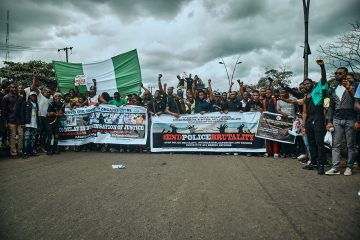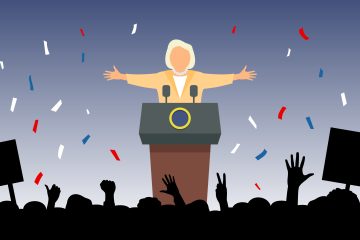
Politics in Nigeria After Social Media
A Pew Research Centre survey showed that citizens of 19 advanced economies consider social media simultaneously constructive and destructive in political life. A majority of citizens believe that social media has had a positive impact on democracy. What about frontier economies? How has social media affected politics and political interaction in African countries with rapid population growth, increasing life expectancy, and widespread poverty? Consider Nigeria. In mid-2017, Nigeria was the most populous nation on the continent. By 2050, Nigeria will be the third most populous nation in the world. This large population has increasingly adopted social media. There were approximately 33 million users in 2022, up from 18 million in 2017. Young people aged 18 to 34 make up the …

Who is afraid of ChatGPT? The Political Problem of AI
Sam Altman, co-founder of OpenAI, the company behind generative artificial intelligence model ChatGPT, released a statement on February 24th regarding the short-term and long-term prospects of their invention. Although well-intentioned, many technologists were perturbed by its tone – it felt as though Altman expected the world to change to suit the interests of the company, rather than the company opening itself up to social and political regulation to accommodate itself to our world. But what is ChatGPT and why is it causing concern? ChatGPT is arguably the first successful generative model of artificial general intelligence. As a large-language model, it offers several advantages over its competitors and predecessors. Firstly, ChatGPT is trained on a massive amount of data, a corpus …

Politics as content: populist performance and discourse by reactionary political influencers on YouTube
Marketing itself as a corrective to the monopoly of mainstream media, YouTube has reduced the barriers of access for people to create and star in their own content regardless of their economic and cultural cachet. Among those taking advantage are “political influencers” or “ideological entrepreneurs” – creators who disseminate and monetise politics as content using the techniques of brand influencers to grow audiences. In part shaped by the platform they are on, creators selling politics suffuse their discourse and performance with an anti-elite and transgressive messaging. Ultimately, this has implications for the legitimisation of conspiracies and the mainstreaming of the far right. As with any type of influencing, the creator is the central figure, performing a relatable and authentic identity …

Tech, politics and publicness
I have had a laminated image pinned, stuck, or otherwise attached to various office walls for many years, since 2003 indeed, as I’ve moved between roles and institutions this has been one constant. The image is from the cover of Mute Magazine, Issue 26. It is a line drawing depicting a desk, on it a Macintosh PowerBook G4, Apple’s then state of the art portable computer – around it are drawn scenes from the global anti-capitalist struggles of the period. There is a picture of Sub-Commandant Marcos of the Mexican Zapatistas, in iconic balaclava, smoking a pipe and looking away into the mid-distance. There is another picture of workers in a field of GM crops, and one of a high-tech …

Covid-19 protests, YouTube, and the platform spectacle of populism
YouTube is a prime space for the communication of the hundreds, if not thousands, protests that have taken place around the world since mandatory measures were introduced by governments to contain the spread of the Covid-19 pandemic. From New York to Tokyo and from London to Sydney, protesting social distancing, face coverings, lockdowns and vaccines is caught up in hours of video footage by protesters themselves, passersby, and reporters, featuring as content for the YouTube channels of major international news agencies. According to a recent publication in Harvard’s Misinformation Review, such videos often serve as a backdrop for commentary out which emerge “participatory cultures of conspiracy theory knowledge production and circulation”. Here, I would like to shed light on a …

Digital Capitalism in the Age of the New Patriarchs
How useful is it to think about politics and power in terms of a patriarchy? What if we think about the US celebrity founders who own monopoly tech companies as a racialized patriarchal network? Patriarchy can be a blunt instrument if we don’t investigate what is particular about a patriarchal system. But if we try to understand who the patriarchs might be, what is specific about their formation, and how they legitimate and wield dominance, then this could be part of forging a resistance. In our book The New Patriarchs of Digital Capitalism: Celebrity Tech Founders and Networks of Power we look at the powerful celebrity men that founded US monopoly tech companies: Mark Zuckerberg, Jeff Bezos, Elon Musk, Larry …

Their Algorithmic Constitutions? On The Emergence and Functioning of Platform Governance
While the idea of platform governance is not new, the complex nature of its functioning and the reasons for its emergence and entrenchment still lack holistic conceptualisation. While it is impossible to develop such a perspective in a single blog post, the considerations below are intended as a sensitising tool and a call to think about platform governance as simultaneously premised upon societal developments from which it has emerged and a pervasive force shaping contemporary societies. In order to better understand the how and why of platform governance, at least two arguments are possible, although they are by no means mutually exclusive: a historico-political and an economic one. On the historico-political side – and for perhaps the most eloquent account, …

Visualising the future of visual politics
Visual campaigning is not new to the social media era. In the US, the first political cartoon was published by Benjamin Franklin in political pamphlets in 1747. Visual symbols such as the bald eagle, stars and stripes, and the colours of red, white and blue have been used in campaign posters going back to 1828. Visual campaigning only intensified from the 1960s onwards with the proliferation of television, with the first televised debate between Nixon and Kennedy in 1964 widely hailed as being a turning point. A young and charismatic Kennedy contrasted sharply with an older Nixon, who appeared sweaty and pale (Messaris 2019), and the appearance and personalities of party leaders has played an increasingly important role in political …









